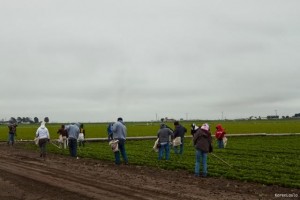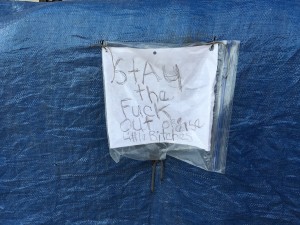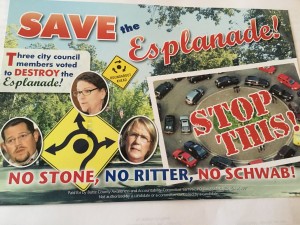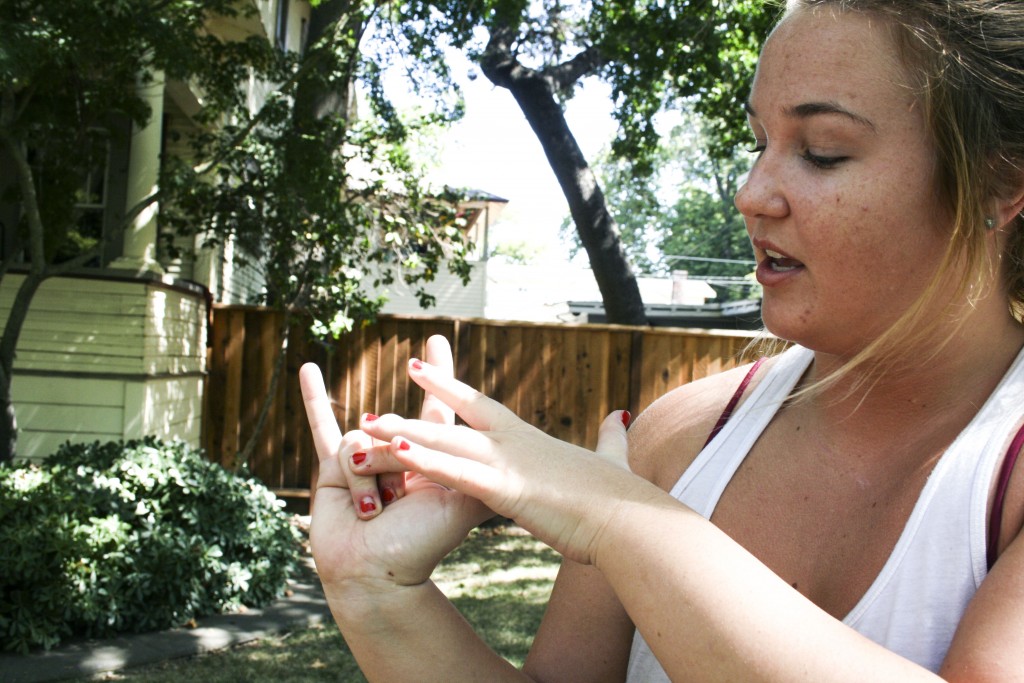On the Nov. 15 #NoDAPL National Day of Action, Chico-area residents demonstrated in front of U.S. Bank, one of a number of American financial institutions said to be funding the Dakota Access Pipeline. According to the environmental advocacy organization Food & Water Watch, U.S. Bank has some $275 million invested. The pipeline would carry fracked oil from North Dakota to Illinois, and the Standing Rock Sioux are leading what is now an international movement to halt construction in order to protect the Missouri River and sacred grounds.
Trump presidency alarms immigrant community
Advocates say take steps to prepare
by Leslie Layton
Immigrant rights advocates are bracing for an uphill fight in the wake of Donald Trump’s presidential victory and encouraging people who could be harmed by an immigration crackdown to take steps now to protect themselves.
“We definitely have a fight ahead of us,” said Kamal Essaheb, director of policy and advocacy at the National Immigration Law Center (NILC), “a fight against the criminalization of immigrants and people of color, a fight for true economic justice for a country where everybody, regardless of the color of their skin or immigration status, can seek opportunities to make their lives better. And immigrants, documented or not, will be a critical part of that fight.”
Trumped up hate biggest thing to fear
Undocumented students and others are anxious
Across the country Wednesday morning people woke up to face the unexpected. It’s fair to say that Donald Trump and Hillary Clinton supporters alike were dealing with shock.
It seems all along there was a “silent vote” for the former reality TV star that gave him the edge he needed to beat Clinton. Pollsters were not aware. Political pundits were not aware. The best research a campaign could buy could not identify the hidden resentment harbored by thousands who were not visible among the raucous Trump base.
So on the morning after the election as people turned on their radios and TVs and opened their newspapers, they were reminded that the United States is not the country they might have thought it was. For millions of Americans it was a terrifying wake up call.
Trickle-Down Meanness Shapes Attitudes Toward Homeless
Local Election Outcomes Matter
Sign that replaced a homeless man’s rest site
By Dave Waddell
While waiting for coffee recently, I became fixated on a mentally ill homeless man. He lay on his side in the shuttered entrance to what last was a Walgreens at East Avenue and the Esplanade. Every few seconds, the old, bearded, agitated man would flail his arms toward someone or something that was tormenting him but wasn’t really there. His situation – common across our country – struck me as just so sad and seemingly hopeless.
Yesterday, upon my return for coffee, I noticed that some sort of contraption covered by a blue tarp had taken the man’s place in the entrance. Attached to that tarp was a message, hand-lettered in pencil with more anger than planning: “Stay the Fuck out or else Little Bitches.”
When I look at that sign – and think about its message and its author – I see the face of an angry someone at a Trump rally.
But, really, the meanness of the message is not so different from that sent by the majority of the Chico City Council over the past couple of years: Roust the homeless out of sight; they’re bad for business.
Recently, a noted housing-first advocate from Utah spoke to a packed community meeting at Bidwell Presbyterian Church about solutions to the chronic problem of homelessness. The presentation was attended by council liberals Tami Ritter, Ann Schwab and Randall Stone — all of whom are seeking re-election today, as is conservative Vice Mayor Sean Morgan.
It was telling that none of the council’s four conservatives – Morgan, Mayor Mark Sorensen, Reanette Fillmer or Andrew Coolidge – cared enough to attend that homelessness meeting. Fillmer, who has publicly expressed insensitivity toward homeless in the past, later wrote a letter excusing herself for being MIA that the Chico Enterprise-Record dutifully published. The letter was nonsensical, just like everything else I’ve read written by Fillmer.
Today’s Election Day, and I just want to say that those we elect to our Chico City Council make a difference in how we as a community treat the least fortunate among us.
This commentary was penned by ChicoSol News Director Dave Waddell.
Political Action Committee Attacks Again, Undeterred by State Probe
Investigation sparked by ChicoSol story continues
Seemingly undeterred by a state investigation into its activities, a political action committee is following a script in this year’s Chico City Council race that is similar to the one that brought scrutiny to its politicking two years ago.
The PAC, called Butte County Awareness and Accountability, widely distributed a mailer in recent days that lambasts council liberals Ann Schwab, Tami Ritter and Randall Stone. All three face re-election Nov. 8, along with conservative Vice Mayor Sean Morgan.
The state Fair Political Practices Commission (FPPC) opened an investigation in August into Butte County Awareness and Accountability and its treasurer, Thomas Kozik, as a result of a ChicoSol story that can be read here.
The bulk of Butte County Awareness and Accountability’s spending during the past couple of years has been to produce and mail slick hit pieces aimed at City Council liberals.
The FPPC does not comment on active investigations, but ChicoSol reported that Kozik’s PAC appeared to violate state law by filing its campaign disclosure reports with the Butte County elections office in Oroville, rather than with Chico’s elections office. Kozik did not return a message seeking comment for this story and had previously declined to comment on the FPPC investigation, which can be read about here.
This year’s flier from the PAC focuses on one issue: Schwab, Ritter and Stone’s short-lived support for roundabouts on the Esplanade, Chico’s iconic, tree-lined thoroughfare. In April, the liberal trio joined conservative Mayor Mark Sorensen in approving the roundabouts, but all except Schwab quickly backed off in the face of a major public backlash. The flier claims the three liberals “voted to DESTROY” the Esplanade.
In 2014, Butte County Awareness and Accountability mailed two text-heavy fliers attacking former Chico Mayor Scott Gruendl, who was defeated that election in his bid for a fourth council term.
The financial disclosures Kozik has submitted through Thursday for the Nov. 8 election show that this year his PAC had raised $8,750 and spent about $4,500. The PAC says it paid almost $3,000 to produce and mail a flier — presumably the “Save the Esplanade!” mailer, although it doesn’t specify.
In 2014, about 78 percent of Butte County Awareness and Accountability’s spending went for the two Gruendl mailers. State law requires that if a PAC spends 70 percent or more of its funds in a city race, its fundraising and spending reports should be filed with that city. Instead, Kozik has sent the PAC’s disclosures to the Butte County elections office.
However, unlike two years ago, Kozik recently began submitting to the city elections office “courtesy copies” of his PAC’s disclosure forms for 2016, said Dani Rogers, deputy city clerk. The forms may be viewed here.
As was the case in 2014, Butte County Awareness and Accountability’s biggest donor this year has been Chico developer Wayne Cook, who has given the PAC $3,500 of the $8,750 it has raised to date. Two years ago, Cook donated $5,000 of the $11,162 that Butte County Awareness and Accountability spent.
Butte County Supervisor Larry Wahl also has contributed to the PAC, donating $500 this year.
Cook, who received $2 million in loans from the City Council while building the Hotel Diamond downtown, acknowledged previously that the ads he helped finance against Gruendl turned out to be “pretty harsh.”
Kozik was a leader of the Tea Party in Chico as recently as 2014 but says he no longer is involved with the right-wing group. He was appointed to the Chico Municipal Airport Commission by the City Council in early 2015.
In establishing Butte County Awareness and Accountability in September 2014, Kozik claimed the PAC was a “general purpose committee.” However, in spending the largest part of its funds going after Gruendl, the PAC seemed to behave like a different classification of committee. State reporting forms distinguish between a general purpose committee and one “primarily formed to support or oppose specific candidates or measures in a single election.”
Jay Wierenga, the FPPC’s communications director in Sacramento, has said that while he can’t comment on the Kozik case, PAC treasurers are required by law to submit truthful filings.
“(PACs) are supposed to file at the proper location, based on the type of committee, and where and how they are spending and raising the money,” Wierenga said.
Penalties range up to a $5,000 fine for each violation of the state Political Reform Act.
Dave Waddell is news director at ChicoSol.
Investigators Hunt Cell Phone Missing from Police Evidence
CSUC Students Claim Retaliation for Filming, Excessive Force
Madeline Hemphill demonstrates the grip that the students say officer Dyke used on Nicole Braham.
by Dave Waddell and Bianca Quilantan
What happened to Madeline Hemphill’s cell phone and the video she says would prove excessive force by Chico police?
It’s a question central to law enforcement investigations of the Aug. 27 arrests of Hemphill and her roommate and fellow Chico State student Nicole Braham.
A second cell phone video from the arrest scene — shot by Telvina Patino, a third roommate and Chico State student – has been viewed tens of thousands of times on YouTube and can be seen here.
Chico community activist Emily Alma has labeled the arrests an “excessive force event.” Also critical of police handling of the incident has been Michael Coyle, an associate professor of political science at Chico State. Coyle, who teaches criminal justice courses, said that if good policing means de-escalating situations, what’s shown in the video are poor police practices. “The video looks more like a basic training on how to escalate a situation, physically put someone in pain, and make them afraid of police,” said Coyle, who chairs the American Civil Liberties Union (ACLU) board in Chico. “Whatever happened to community policing?”
Beyond the question of excessive police force and some peculiarities surrounding Hemphill’s missing cell phone, the credibility of an Aug. 29 press statement issued by Police Chief Mike O’Brien also has come under scrutiny. Some wide discrepancies exist between law enforcement’s and the students’ versions of events – most significantly over how much time actually elapsed between their arrests and an earlier run-in with Chico officer Steve Dyke.
Hemphill, a 21-year-old senior psychology major, is certain the entire episode was rooted in retaliation for her filming of the police conducting a drunken driving investigation a short time earlier. While Patino’s video gone viral captures a good deal of Braham’s arrest, only a glimpse of Hemphill’s arrest is seen, though she can be heard pleading her case off camera.
Both Hemphill and Braham were arrested on suspicion of resisting arrest. Braham was charged with that offense by Butte County District Attorney Mike Ramsey, but Hemphill has not been charged and her case remains under investigation. Braham pleaded not guilty to the misdemeanor charge Thursday in Butte County Superior Court and is due back for a hearing Oct. 27. Hemphill and Braham each suffered minor injuries in being taken to the ground by police.
Chief O’Brien said a Chico PD internal affairs sergeant is looking into Hemphill’s claim that she was retaliated against for filming police at the DUI stop. Both Ramsey and O’Brien indicated that the use and whereabouts of Hemphill’s phone are key parts of their investigations.
Hemphill insists that immediately after officer Dyke ordered her taken to jail, she was “tackled” by other officers into a hedge of heavenly bamboo in the divider between the Esplanade and its eastside frontage road. Questioned about whether “tackled” was the proper word to describe what occurred, Hemphill said: “Absolutely. There’s no other word.”
Hemphill said she clung to her cell phone, which recorded a bit of the Braham arrest and the beginning of her own arrest, until it was pulled from her hands by officers, she said. “The video shows them using excessive force on me,” Hemphill said. “I also think officer Dyke was trying to punish me for videotaping him.”
The last time Hemphill believes she saw her phone was shortly after her arrest while handcuffed in a police car. Several officers were gathered together; her impression was they were looking at video from her phone – while conversing and, at times, laughing. She equated the scene to that of a locker-room or break-room.
Chief O’Brien’s Aug. 29 statement claims that “Hemphill had lost her cellular phone during the arrest. Officers have searched for the phone at the scene, police station, and the patrol vehicle she was transported within. The phone has not been located.”
Hemphill insists she was asked by Chico officers twice – once at the scene of her arrest and again later at a Chico Police Department holding facility – for permission to access the video on her phone as evidence. Both times she said she granted them permission.
Although not mentioned in his press statement, O’Brien acknowledged recently that Hemphill was asked by officers “at least once to access her phone, but that was with the mistaken thought that we had possession.”
Braham, 19, was with Hemphill in that police holding facility. Unlike Hemphill, she had not been drinking the night of the arrests, acting as designated driver. Braham told the board of the Chico chapter of the ACLU, Northern California, at its Sept. 8 meeting, that she remembered a Chico officer’s exact words to Hemphill: “Is it OK if we use the video on the phone as evidence?”
Upon her release from the Butte County Jail, Hemphill’s cell phone was not among the personal property returned to her. It was a Saturday morning, the Chico Police Department was closed, but she was allowed into the lobby after buzzing in and pleading for her phone. An officer told her the phone was in evidence and the earliest she could get it back would be at her first court date. Hemphill’s father called Chico PD an hour or so later and also was told the phone was in evidence, she said.
Hemphill went home to sleep and awoke to find email messages about her phone. “I had gotten three emails in my sleep: change iCloud password, iCloud password successfully changed and Find My iPhone has been disabled,” she said.
Warrant Obtained for Missing iPhone
Hemphill returned to the Police Department on Monday, Aug. 29, and met with Sgt. Greg Keeney, who told her he didn’t know anything about her phone but would look into it. Keeney told her the email alerts she received about the phone’s use were consistent with police protocol for hacking a phone in evidence, according to Hemphill.
She said her father’s records also indicate her voice mail was called on Aug. 28.
Hemphill said use of her cell stopped Aug. 29, noting that was the same day O’Brien reported the phone was missing.
Hemphill was interviewed about the phone on Sept. 15 by investigators from the district attorney’s office. They told her a warrant was obtained to find out through Apple and T-Mobile where the phone was used during the three days after Hemphill’s arrest, she said.
“Apparently each time they open the phone up to use data there is a GPS in it,” she said. “They can go in and track it and see … where it was from.”
The Aug. 29 press statement issued by O’Brien makes note of Hemphill’s .141 blood alcohol content at the time of her arrest. What O’Brien’s press statement didn’t reveal is that police also tested Braham’s blood alcohol content at Chico PD’s holding facility. Braham’s test found no alcohol in her system, a fact not disclosed by police while trumpeting the drunkenness of Hemphill, who had not been driving.
O’Brien acknowledged that his statement excluded Braham’s .000 BAC but says he mentioned the fact in media interviews. Asked why Braham’s blood was tested for alcohol content, O’Brien said “BACs are often taken of arrestees to ensure proper prisoner processing.”
Hemphill contends that the police response to Dyke’s call for back-up while detaining Braham was one of the most sobering events of her life. Officers arrived to the scene quickly from seemingly every direction. The YouTube video captures Dyke, his knee on the prone Braham’s back, pointing to Hemphill and twice ordering her taken to jail — just as she was beginning to videotape the scene, she said.
“It was like we were living a nightmare,” Hemphill said.
O’Brien’s statement says that after Dyke ordered Hemphill’s arrest for “officer safety purposes,” Hemphill “tensed her arms in attempts to resist being placed into handcuffs. Based on her failure to cooperate and resisting arrest, Officers had to place Hemphill on the ground, where she was detained in handcuffs.”
Hemphill and Braham told the ACLU board that the attitude of the Chico officers toward them ranged from rudeness to ridicule – from the time they were arrested until they were dropped off at the county jail in Oroville hours later. “When we got to Butte County (jail), they changed us into these orange jumpsuits with chains around our waists before they cleaned our cuts, but it was the first time we were actually treated like human beings,” Hemphill said.
In Patino’s nine-minute YouTube video, Patino is at times heard talking with officers and frequently crying while filming. It was Patino’s car that Braham was driving that night. Patino, who had been out on a Friday night drinking with Hemphill, was the passenger. At one point Patino describes officer Dyke’s behavior to another officer as “super aggressive for no reason.” Later, when Patino is informed by Dyke that a burned-out license plate light precipitated the stop, she sounds incredulous. “Are you serious?” she asks him.
At another point, Patino questions Dyke about why he twisted Braham’s arm: “That was not OK,” she tells him. The officer responds that Braham refused to follow his order to get back into the car. “She (Braham) was sober,” Patino tells Dyke. “Her car was off when you pulled her over. …There are people drunk driving out there, and you’re going to get us for this? Like, we did everything right.”
Later in the video, Patino is alone and sobbing while calling out to Hemphill, who had disappeared into the night’s darkness and flashing lights: “Maddy, are you OK? Are you OK? …Are you OK, Maddy?” An officer approaches Patino and tells her that Hemphill and Braham are fine and headed to jail. “You’re just saying that like it’s funny,” Patino tells the officer.
Coyle, the professor and ACLU board chair, said O’Brien’s description of police treatment of Braham soft-pedaled the actual force used against her. As evidence, Coyle pointed to the following language from O’Brien’s statement: “… Officer Dyke made the decision to allow (Braham’s) own momentum to carry her to the ground.”
“The police chief’s description is an insult to anyone’s intelligence,” Coyle said.
Hemphill said the claim in O’Brien’s press statement that Dyke had three times ordered her out of the street while filming the DUI stop was false, as was O’Brien’s suggestion in news accounts that she was trying to hide while filming.
DA Ramsey, in a Sept. 16 interview at the Butte County courthouse in Oroville, said that, unlike with Braham, there isn’t evidence to support a charge of resisting arrest against Hemphill.
Asked about Hemphill’s claim that she twice was asked by Chico police to access the video on her phone, Ramsey said Hemphill had “perception and memory problems” because she was intoxicated. Informed that the sober Braham claims she too heard police ask to use the video as evidence, Ramsey said his investigators had not been able to question Braham as a result of her retaining counsel.
According to Chief O’Brien’s Aug. 29 statement, Dyke noticed Hemphill filming the DUI investigation at 1:40 a.m. on Aug. 27 and that he pulled over the vehicle Braham was driving at 2:08 a.m.
Similarly, Ramsey said it was his impression that Hemphill’s initial filming of the DUI stop took place about 30 minutes before the arrests of Hemphill and Braham. But by Hemphill’s estimate, the time gap was actually five minutes or less – an account that, if true, might lend more credence to the retaliation claim.
Missing Video May Show Excessive Force
Hemphill said she feels a duty as a citizen to film police in order to curb abuses of power. That night, Dyke had been so angry about her filming, she decided not to get into the car driven by Braham, who had pulled over to wait. “I could tell by listening to him for one second that officer Dyke is an aggressive man,” Hemphill told the ACLU board.
O’Brien’s press statement says that Dyke had noticed in the initial encounter a burned-out license plate bulb on the car. Concerned about causing problems for Braham, Hemphill said she decided to walk the two remaining blocks to their residence in the 1000 block of the Esplanade. Braham told the ACLU board she, too, was surprised, sitting in the car, how much “that guy was really yelling.”
According to Hemphill, after the DUI check yielded no arrest, Dyke headed north in his patrol car from the 800 block of the Esplanade and turned right onto First Avenue. It’s her supposition that he made three more immediate rights — onto Oleander Avenue, then East Sacramento Avenue, and finally onto the Esplanade frontage road. Dyke turned on his vehicle’s emergency lights as or after (depending on the account) Braham parked the vehicle with the burned out license plate bulb – “badly,” according to DA Ramsey – in front of the students’ residence. According to Hemphill, Dyke “ran” from his patrol cruiser to confront Braham as she was stepping out of the car.
O’Brien’s statement says Braham “failed to acknowledge three requests” by Dyke to get back into the car and also had to be told three times to drop her keys and lanyard.
Braham, who has not returned calls seeking comment, shortly after the incident told Chico State’s student newspaper that Dyke immediately yelled that she was being detained and to drop her things. “I took a step forward and he grabbed both of my arms, slammed them on (Patino’s) car, rag-dolled me around on the car and moved me to the police car,” The Orion quoted Braham as saying.
Braham told both the ACLU board and The Orion that she appears in the video to be pulling away from Dyke’s grip because he was bending her fingernail back while holding her hand and wrist, causing extreme pain. In The Orion account, Braham said it was Dyke’s twisting of her arm that forced her movements: “I couldn’t untwist my arm. He moved my body. I just took steps to not fall.”
As for Hemphill’s missing phone, Ramsey said there “doesn’t appear to be any advantage to the police of having that,” noting that Hemphill had filmed a DUI investigation in which the driver was cleared. Hemphill disagrees, contending her subsequent filming would prove that officers used excessive force in arresting her. “I capture that in my video,” she said.
Asked at the end of the Sept. 16 interview if he had any other thoughts about the incident, Ramsey paused, smiled and replied: “If they find that cellphone at the Chico Police Department, I’ll be really pissed.”
Dave Waddell is news director of ChicoSol. Contact him at DWaddell@csuchico.edu.
